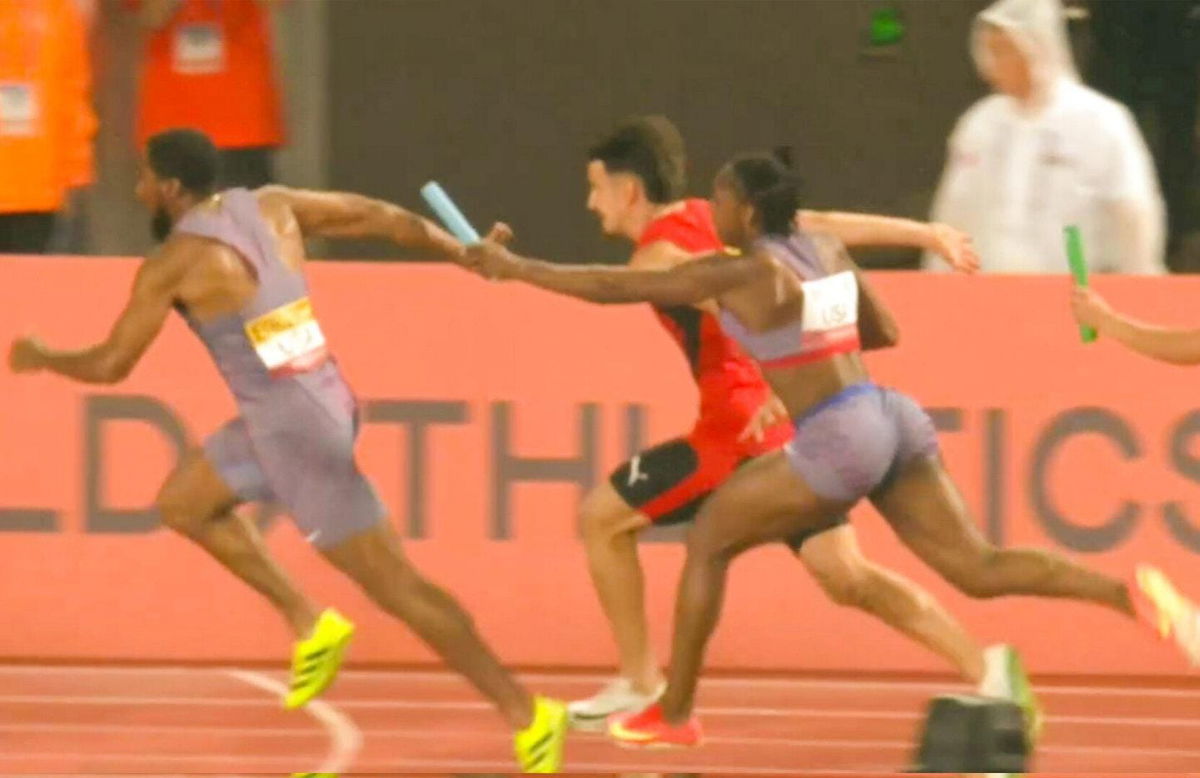
Imago
Credits:X

Imago
Credits:X
For a country synonymous with speed, what unfolded at the 2025 World Athletics Relays in Guangzhou was nothing short of a major letdown. Team USA, once the gold standard in relay racing, walked away with just a single gold medal, their weakest showing in recent memory. A thunderous comeback quickly unraveled as the teams made a series of missteps and miscues. The kind of chaos that once haunted American relays in decades past returned with a vengeance, and this time, the world was watching closely.
Watch What’s Trending Now!
It wasn’t just bad luck. It was systemic. Exchange zone blunders, shaky chemistry, and split-second indecision plagued almost every U.S. team on the track. Despite boasting some of the world’s fastest sprinters, America’s baton continues to be their greatest enemy. And while nations like Canada seized the opportunity to rise, the U.S. was left answering uncomfortable questions. That’s when American sprint legend Justin Gatlin stepped in. Not just with opinions, but with pointed insights into exactly what went wrong.
In a recent episode of the Ready Set Go podcast, legendary sprinter Justin Gatlin didn’t hold back as he broke down the cascade of errors that plagued Team USA’s relays in Guangzhou. Zeroing in on the mixed 4x100m debacle, Gatlin shared his candid reaction to the costly exchange zone mishap. “Team USA and Poland bobbled a stick on the second exchange, so they didn’t make it to the finals or qualify for the finals for the mixed relay,” he said. “They were out, man.” Gatlin, a veteran of countless high-pressure international relays, has seen it all but even he sounded stunned by the meltdown. The missed opportunity, not just for the U.S. but for the Polish team as well, both of whom were expected to be contenders. “Love to see them in the finals, both teams, but they didn’t get a chance.”
ADVERTISEMENT
That moment wasn’t just one misstep. It was a larger collapse. May 9 was the day the baton became America’s burden. In the men’s 4x400m, a strong quartet of Jevon O’Bryant, Lance Lang, Kennedy Lightner, and Elija Godwin posted a season-best 3:01.23. But in a meet this brutal, even your best might not be enough. They finished third in their heat just outside the auto-qualifying spots with France and Kenya racing ahead to book their tickets to Tokyo. For a country that owns the 4x400m, this one stung. The drama didn’t stop there. The mixed relay unit, stacked with familiar Olympic names like Kenny Bednarek and Twanisha Terry, looked poised to dominate until a baton drop on the second exchange turned their hopes into a puddle of regret.

ADVERTISEMENT
A rain-slicked track, a split-second miscue, and just like that, 25 seconds vanished. Disqualified. Gatlin, reflecting on it all, admitted that the chaos had entertainment value: “I think it’s so cool because this is what we’ve been talking about, bro—like put together a men’s and women’s 4×1 team and see how it would unfold. And from the looks of things, it was pretty exciting—it looked pretty good.” Exciting? Sure. But for Team USA, it was also a brutal reminder that talent without chemistry is a ticking time bomb on the track.
ADVERTISEMENT
Why top U.S. stars are skipping the relays
Once a crown jewel on the track calendar, the World Relays are now missing their sparkle largely because marquee names like Sha’Carri Richardson and Noah Lyles are opting out. But this isn’t a case of fading patriotism. American sprinter Noah Williams points to the event’s structure and athlete compensation as the real issues. “The way they split the checks up and everything is very interesting… It’s kind of like almost treating it like a participation award,” Williams stated candidly. And it goes deeper than prize money. “They want as many people as possible running,” he added, highlighting a system that values volume over athlete sustainability. Athletes are demanding more than symbolic medals. They want real investment.
That demand becomes even more pressing when you consider the sacrifice required just to compete. The grueling training, cross-continental travel, and peak pressure all collide in a sport that gets a brief window of global attention. Leagues like Grand Slam Track and Athlos are slowly changing the landscape, offering more consistent pay and year-round visibility, but for most athletes, the financial reality remains bleak. Williams’ comments echo a growing frustration among sprinters who feel the current model doesn’t just undervalue them. It burns them out. Until that equation changes, more and more stars may choose to sit these events out, prioritizing their careers over a relay with dwindling returns.
ADVERTISEMENT
Top Stories
NFL Makes Final Decision on ICE Enforcement at Super Bowl LX Amid Bad Bunny’s Grammy Speech

Todd Monken Announces Bad News for Shedeur Sanders Amid Browns QB’s Controversial Pro Bowl Decision

U.S. Senator Announces Bad News For NFL Fans After Donald Trump’s Ruling on ESPN’s Billion-Dollar Takeover

PGA Tour Pro Loses His Cool After Being Denied Entry Into WM Phoenix Open Field

Lions Fan Grabbed by DK Metcalf Files $100M Lawsuit After Demanding Formal Retraction

Patriots’ Stefon Diggs Announces Retirement Stance Immediately After Super Bowl LX

That discontent was painfully visible during the mixed 4x100m relay, where disaster struck Team USA in the most dramatic fashion. During Heat 1, a strong squad faltered at the worst moment. The second exchange. Jada Mowatt handed off to Kendal Williams, but the baton slipped through their hands and slammed onto the rain-slicked track. By the time it was recovered, the damage was done. Once known for dominance, the U.S. was nowhere near the podium as other nations took center stage. This wasn’t just a race gone wrong. It was a symbol of a system that may be losing its grip on the very athletes it hopes to showcase.
ADVERTISEMENT
ADVERTISEMENT
ADVERTISEMENT